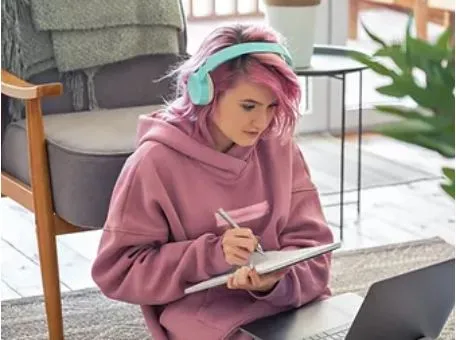ByOnlinecourses55

Conditions for study - study techniques
Studying requires a considerable expenditure of energy, as it involves a significant mental effort. We are subjecting our brain to a process in which we are trying to acquire new knowledge or skills. This is not a routine task, but requires our mind to be active and receptive in order to facilitate learning.
With this in mind, there are some things we can do to make the study process less challenging. It's all about improving the conditions in which we study. No matter what your situation is, how much space you have at home or if there is a lot of noise around you, it is always possible to adjust certain aspects to create a more pleasant study environment.
Here are some key points to consider when creating and optimizing your study space.
No matter the size of your desk, make sure you have only the essentials to get your work done. Having a lot of unnecessary items in sight can give the impression that you have more work than you actually do. An uncluttered desk, with few items, conveys calm, reduces stress and gives you a greater sense of control over your environment.
Avoid leaving your books or notes in disarray when you finish studying. If you no longer need them, put them away. This way, when you resume your studies, you won't have to start by picking up or cleaning up, which will save you time and allow you to start with a more positive attitude.
When working at a computer, we often neglect the lighting in the space. This is a common mistake that, over time, can seriously affect our eyesight, causing long-term problems. In addition, inadequate lighting can make us feel more tired quickly, decrease our performance and even cause headaches or dizziness due to the contrasts between the light on the screen and the dark environment.
If you work with paper, a desk lamp can be very useful. Make sure it illuminates well what you are writing to reduce eyestrain and avoid mistakes. And, of course, never study in the dark. If you prefer to study at night, make sure you have a good light source in your workspace.
Before you start your work, make sure you have everything you need at hand. This applies to both a book and a specific tool, the goal is to avoid interruptions. Pauses to look for what you're missing can cause you to lose focus and pace, as well as increase the chances of getting distracted. You may also want to have water or a drink nearby to avoid getting up unnecessarily before finishing your homework.
Remember that your study space should be a comfortable and inviting place. You should adapt it to your needs to maximize your productivity and study efficiency.
Are you interested in Learning and Studying courses?